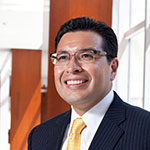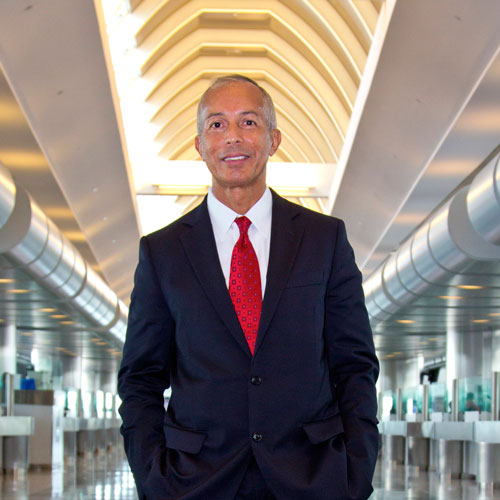Very few doctors make house calls these days. Even fewer see patients who can’t pay. Dr. Mario Molina recalls sitting in the family car as a child while his father, David, saw low-income patients in their homes. That was more than four decades ago. As Mario and his interest in medicine grew, he would visit his father in the emergency room and watch as David treated Medicaid enrollees who didn’t have a primary-care physician of their own. When the elder Molina opened a low-cost clinic in California’s Long Beach area, Mario and his siblings helped out by cleaning floors, organizing closets, and filing medical records. Today, the Molinas continue to serve low-income families and individuals—only on a much larger scale. What started as a lone clinic in 1980 has become the publicly traded Fortune 500 company known as Molina Healthcare, Inc.
Though the size of Molina Healthcare has changed over the past 34 years, its mission remains the same. “We’ve carried on my father’s vision of caring for people who are underserved and in need,” Mario says. While insurance companies operate most health plans in America, Molina’s plans remain in the hands of physicians—Mario leads as president and CEO. His brother, John, is chief financial officer, and his is sister, Martha, is executive vice president.
The Molinas share their father’s passion for providing health care differently. Their patients are ethnically diverse; a high percentage are Hispanic and many speak limited English. In response, Molina Healthcare has hired bilingual employees to work in its call center. “People who have a health emergency need to connect with someone who speaks their native language without relying on a translator,” Mario says.
Today, Molina Healthcare provides primary care clinics, health plans, and health information management solutions. “It is our belief that everyone should have access to quality health care despite the obstacles and barriers that often exist,” says Mario. In some locations, Molina provides free community shuttles to take patients to and from clinics, libraries, grocery stores, and community centers. In Texas, Molina Healthcare manages in-home support services that assist with bathing, dressing, meals, shopping, and home modifications. Molina strives to understand the problems and experiences of the underserved clients. For this reason, the company hires people with disabilities, both as full-time employees and advisors. A 24-hour hotline gives accurate health information that often prevents low-income patients from taking an unnecessary—and costly—trip to the emergency room.
Going public
In 2003, Molina Healthcare started trading on the New York Stock Exchange under the symbol MOH. Since then, the company has increased revenue by more than six times and doubled its enrollment. In 2013 4,000 additional workers were hired to bring its total to nearly 8,000 employees across the country. The expansion came ahead of the Affordable Care Act (ACA) and Insurance Marketplace rollouts. Molina Healthcare—as a managed care provider that serves those eligible for Medicaid, Medicare, and other government-sponsored programs—is prepared to enter a new era.
Several states, including California and Illinois, awarded Molina contracts in 2013. to provide services to beneficiaries who qualify for Medicare and Medicaid. “These patients represent the sickest of the sick and will benefit from the coordinated care we can bring,” Mario explains. “Their issues are complex and complicated by poverty and social challenges. Our experience and our systems can address their issues effectively.” As the ACA expands Medicaid, Molina Healthcare is entering new states such as Illinois, Ohio, and South Carolina for the first time. Additionally, the company plans to increase its number of clinics (now at 25) in 2014 and beyond.
The new clinics are key to Molina’s growth strategy because they serve as hubs where salaried doctors can give hands-on care. Forty years ago, David Molina was seeing patients who didn’t have a regular doctor in the emergency room. Mario Molina is noticing the same problem today. “It is my hope that the trend will shift away from large centers where people get different doctors and move to a system of centralized care with familiar and consistent community doctors.” Although the Affordable Care Act stands at 2,500 pages, the complex piece of legislation was created in part to increase competition in health care. That, Mario says, will force providers to compete on value and demonstrate quality through results.
Community outreach
Molina Healthcare is working to publish the results of its programs—results that will demonstrate that hospital stays can be shorter, immunization rates are climbing, cancer screenings have been completed, and patients are generally healthier. “However,” Mario Molina explains, “we need to increase our level of communication with our existing and potential members because there is still a barrier if people can’t or don’t get the care they need.” A Molina Healthcare program called Community Connectors dispatches trained experts into communities where poor, disabled, uneducated, and other shut-in individuals are not getting the care they need.
As Obamacare unfolds over the next two years, Molina expects revenue to double. With more than three decades of experience, Molina’s organization is familiar with changing governmental procedures and processes. “We have an experienced compliance department, and we’ve been doing business this way forever,” he says. “Other companies aren’t as accustomed to being in such a highly regulated environment, but for us, it’s normal.”
Molina Healthcare is poised to lead the way in this changing health care environment. As the evolution continues, clinics will continue to open in more states and Molina Healthcare will expand nationwide. In doing so, David Molina’s mission of providing quality health care to those who need it most carries on.

